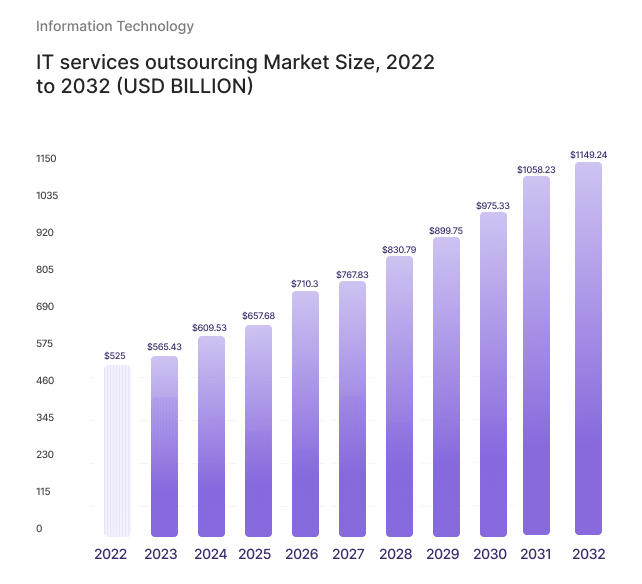In today’s fast-paced business landscape, IT outsourcing has become a strategic necessity for companies aiming to stay competitive while focusing on their core operations. Outsourcing IT services can bring a myriad of benefits, including cost savings, access to specialized expertise, and increased efficiency. However, selecting the right IT outsourcing partner is crucial to ensure the success of your initiatives. With a multitude of options available.
A recent report by presecendenceresearch.com confirms that the global IT services outsourcing market size was estimated at USD 525 billion in 2022, and it is expected to hit around USD 1,149.24 billion by 2032, poised to grow at a compound annual growth rate (CAGR) of 8.2% during the forecast period of 2023 to 2032.

Based on this information, it’s evident that nearly 80% of global companies opt for IT outsourcing to access top-notch IT support. However, before selecting the ideal IT support provider from a distant location, there are several essential factors you should be aware of.
Here, we have outlined a number of crucial steps to assist you in selecting the ideal IT outsourcing partner for your company.
1. Define your requirements clearly
Start by clearly defining the specific IT needs and goals of your company. Figure out which services or projects you want to outsource, whether it’s things like software development, technical support, cybersecurity, or any other IT-related tasks. This clear understanding will help you explain your needs better when talking to potential outsourcing partners. To make sure you really understand what your organization’s IT needs are, it’s a good idea to gather team members from different departments in your company. This way, you can have discussions about what the organization’s current IT requirements are and how they tie into its bigger goals and objectives. This collaborative approach will aid in achieving what you’re aiming for.
2. Look for a potential outsourcing partner:
When seeking suitable IT support from remote vendors, it’s essential to assess whether the vendor meets the mandatory criteria on your checklist of expectations. The first point of your checklist will be the experience and expertise of the outsourcing companies. To know that, here are a few points you should consider carefully.
- Their experience in the industry.
- The specific services they offer.
- Their track record of delivering quality work.
- Their pricing and payment terms.
- Their security and compliance practices.
- Their cultural fit with your company.
3. Consider technological proficiency
Technology is at the heart of IT outsourcing. Ensure your potential partner is proficient in the latest technologies, methodologies, and tools relevant to your projects. Their ability to adapt to technological advancements will impact the quality and efficiency of the services they provide.
FYI: A study by McKinsey found that a 10% increase in IT skills proficiency can lead to a 1.5% increase in productivity.
4. Assess scalability and flexibility
Business needs can change rapidly, so it’s important to choose an outsourcing partner that can scale their services according to your requirements. A flexible partner will be able to accommodate growth, changes in project scope, and evolving market conditions.
5. Communication and collaboration
Effective communication is essential for successful outsourcing partnerships. Choose a partner that maintains transparent and open lines of communication. They should be responsive to your inquiries and concerns, fostering a collaborative environment that feels like an extension of your in-house team.
Did you know? In 2023, the Harris Poll, commissioned by Grammarly, investigated the status of business communication. The findings revealed that 72% of business leaders are of the opinion that effective communication has amplified their team’s productivity.
6. Data security and compliance
Security breaches can have severe consequences. Prioritize data security by selecting a partner with robust cybersecurity measures and compliance with relevant industry regulations. A reputable outsourcing partner will safeguard your sensitive information and maintain strict data privacy protocols.
7. Location and time zone
Consider the geographical location of your outsourcing partner. Differences in time zones can impact communication and collaboration. Choose a partner whose working hours align with your business operations to ensure smooth interaction.
8. Cost efficiency
While cost savings are a significant motivation for outsourcing, the focus should be on value rather than just the lowest price. Evaluate the overall cost-effectiveness of the services offered in relation to the quality and expertise provided.
9. Cultural compatibility
Cultural compatibility can greatly influence the success of an outsourcing partnership. Look for a partner whose work culture and values align with your own company’s culture. This alignment can foster better collaboration and understanding.
10. Due diligence and references
Before making a final decision, conduct thorough due diligence. Speak to the outsourcing partner’s references and ask about their experiences. This step can provide valuable insights into the partner’s strengths, weaknesses, and overall performance.
Following a comprehensive assessment of the aforementioned criteria, you will have compiled a roster of potential partners. Consequently, identifying a suitable partner from this list becomes a less arduous endeavor. Simply convey your requirements to the vendors and request quotations from them.
Once you’ve obtained quotations, request references from each potential partner. This offers an opportunity to communicate with other companies that have collaborated with the partner and gather their input. Upon reviewing the quotes and references, arrange demonstrations and interviews with the partners that pique your greatest interest.
This provides a platform to delve deeper into their services and determine their suitability for your business. After completing your thorough research, the time has come to make a decision. Evaluate the advantages and disadvantages of each partner and select the one that aligns best with your requirements.
Final thoughts
In conclusion, choosing the right IT outsourcing partner requires careful consideration of your company’s needs, the partner’s expertise, technological proficiency, communication practices, security measures, and cultural compatibility. By following these steps, you can establish a successful and long-lasting outsourcing relationship that brings value to your business while allowing you to focus on your core competencies.








